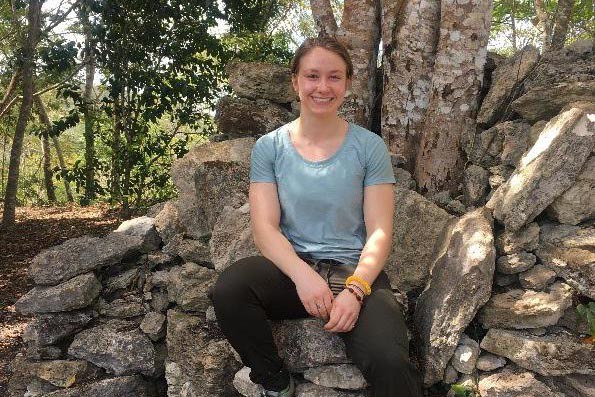Posted: May 23, 2019
“Going into this trip, I was expecting to learn about the culture and agricultural sector of Belize but in reality, I learned that agriculture can mean so many different things and that there is truly something to learn from everyone you meet.”
"Do you even know where Belize is?" is the first thing that my mom asked me when I called her after the Study Abroad fair, already planning to pack my bags to travel to the tiny Central American country for spring break (March 1-9) of my sophomore year. At the time, I knew that Belize was south of Florida and much warmer than Pennsylvania during March which I thought was all that I needed to know. After spending 8 days traveling throughout the Belizean countryside as part of AEE 499: Indigenous Knowledge and Agricultural Education, I realize that Belize is a country with a rich culture and history as well as a great model for the growth of agriculture in all its forms.
One of the best parts of this trip was seeing the full spectrum of what agriculture can be in such a small and diverse community. I grew up in northern Pennsylvania, near smaller dairy or produce farms and have seen large scale American farming but for the most part did not feel very connected to agriculture. All of that has changed since taking this course and studying abroad. In Belize, I was able to see subsistence farming of a variety of native crops by the Mayan farmers. We toured smaller industries such as a Mayan chocolatier or Marie Sharpe's hot sauce making business, which is taking off internationally, and I discovered that bananas come from plants and not trees at a massive, monoculture banana plantation. Each of these places had something unique to offer in terms of agriculture and its contribution to Belizean society.
What I learned from the Mayan farmers is that farming does not necessarily mean neat rows of vegetables or even having set places for certain crops. In Belize, the Mayan farmers use more agroforestry techniques for farming that involve allowing plants to grow very naturally and interspersed with each other. While walking through one farm, it was difficult for me to distinguish where the farm ended and the jungle began but the farmer was able to point out specific crops and explain why some plants grew better together than others. They were also incredibly proud that they are an entirely organic operation and do not spray for insects or use heavy machinery which is different from farms that I have seen at home. Listening to them speak about the indigenous knowledge that their parents or grandparents had passed down about the plants and farming techniques that they are still using today was incredible and showed me how integral a personal connection to agriculture can be.
This personal connection to family roots and pride in their Belizean heritage continued to be a common theme even in the larger industries. At Marie Sharpe's hot sauce factory, we received a tour from the grandson of the owner and he shared more of their family story and the values their company holds. Marie Sharpe began her hot sauce business as a one woman show and grew it into a fairly large operation and wants to continue giving back to her community. All of her inputs come from local Belizean farmers and she makes a point to employ 80% women in order to create more jobs for them in the agriculture industry. Even the large banana plantation is owned and run by a family that lives in Belize. We received a tour from the daughter-in-law of the plantation owner and she showed us that despite being a large business, they are still trying to be sustainable and give back to the Belizean community by composting imperfect bananas and employing locals.
Despite being an agriculture education trip, we were also able to experience some of the natural beauty of Belize and its history by visiting the Mayan ruins of Xunantunich as well as swimming in the Belize River and eating anything and everything that we were given to try. I have learned that stepping out of my comfort zone is the fastest way to grow as an individual and that there is no harm in being willing to try anything once in reference to food, petting tapirs at the zoo, and hiking through the jungle. Throughout this experience, I was able to greatly develop my communication skills, especially when overcoming language barriers and being willing to ask questions and start a conversation with a stranger, which are things that you cannot learn from a textbook. If a potential employer were to ask about my experience in Belize, I would say that the most important thing I gained was the ability to adapt to new situations and continually change my perception of the world around me, the more that I learned. Going into this trip, I was expecting to learn about the culture and agriculture sector of Belize but in reality, I learned that agriculture can mean so many different things and that there is truly something to learn from everyone you meet.
Ag Sciences Global
Address
106 Agricultural Administration BuildingUniversity Park, PA 16802
- Email globalag@psu.edu
- Office 814-863-0249
- Fax 814-865-3055
Ag Sciences Global
Address
106 Agricultural Administration BuildingUniversity Park, PA 16802
- Email globalag@psu.edu
- Office 814-863-0249
- Fax 814-865-3055


